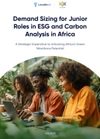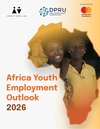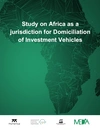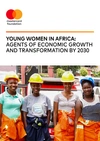Executive Summary
A Strategic Imperative to Unlocking Africa’s Green Workforce Potential
As global demand for Environmental, Social, and Governance (ESG) and carbon analyst roles surges, Africa stands uniquely positioned not only to significantly benefit from the global green economy but also to emerge as a leading global hub for specialized sustainability talent, particularly for junior analyst roles.
This collaborative report by Axum and Localized, drawing on extensive market analysis, expert interviews, and organizational surveys, illuminates a critical but overlooked opportunity: Africa’s potential to become a major talent hub supplying ESG analysts and carbon professionals globally. This report was produced in partnership with the Mastercard Foundation*.
The global ESG landscape is rapidly transforming. Driven by new regulatory mandates, including the EU’s Corporate Sustainability Reporting Directive (CSRD) and the International Sustainability Standards Board (ISSB) standards, organizations worldwide face escalating pressure to disclose rigorous sustainability and climate metrics. Investor expectations have similarly surged, with global sustainable investment assets projected to hit $50 trillion by 2025, reflecting more than a third of total global assets under management (AUM). As a result, ESG analyst roles have emerged as some of the fastest-growing positions globally, with LinkedIn reporting year-on-year growth exceeding 25% for sustainability analyst jobs alone. Nevertheless, a global skills mismatch remains, as jobs requiring green expertise increased by 23%, while the available skilled workforce expanded by only 12% in 2023.
Africa faces an even sharper talent challenge, yet also presents a remarkable opportunity for growth. By 2030, the continent is projected to generate between 1.5 to 3.3 million new green jobs across sectors such as renewable energy, sustainable agriculture, climate smart construction, and green finance. Organizations like Prosus, with its headquarters in Amsterdam, strategically leverage South Africa for the majority of their carbon accounting and ESG analysis tasks, demonstrating Africa s growing competitive advantage as a global ESG talent hub, combining high-quality expertise with lower operational costs. To sustain and scale these capabilities, especially given that Africa receives only about 2 percent of global clean energy investment, the continent must invest in technical training, strengthen academia industry linkages, and expand access to international standards and certifications. While sectors such as financial services and extractives are advancing in ESG maturity, agriculture, local manufacturing, and transportation remain behind, hampered by expertise shortages and weak education-to-industry pipelines. Yet, Africa’s
unparalleled demographic dividend, a rapidly growing youth population projected to be the world’s largest workforce by 2030, offers a compelling foundation for investment. Young Africans are motivated by purposeful, impactful careers. However, without targeted training and career support, the continent risks exporting these opportunities abroad, being overlooked for new opportunities or leaving vital roles filled by international consultants instead of local talent, thus limiting inclusive economic development. Closing this gap requires strategic investment in Africa’s ESG talent pipeline.
Expanding inclusive digital platforms also holds immense promise.
Initiatives like Localized’s Green Talent Forum, which attracted over 7,500 mostly African participants, illustrate the potential to efficiently connect Africa’s emerging ESG talent with global employers, accelerating job placements. Moreover, coordinated public-private partnerships, structured fellowship programs, and targeted boot camps for critical ESG skills, aligned with global certifications, will significantly enhance the global employability and credibility of Africa’s emerging ESG workforce.
Strategic risks remain, including political uncertainty, talent retention issues, and potential inequities in access to training, especially for rural women and marginalized communities. Yet these risks can be effectively mitigated through proactive monitoring, inclusive outreach, diaspora engagement strategies, and embedding ESG skills training clearly within supportive policy frameworks. Our report proposes a clear and practical taxonomy of roles, categorized by organizational functions and required skill levels.
The functional classification covers essential ESG and carbon analyst positions including Carbon Accounting Analysts (measuring emissions and managing data), ESG Reporting Specialists (producing sustainability
disclosures aligned with global standards), Climate Risk Analysts (assessing climate-related financial risks), and Sustainability Managers (implementing organizational sustainability strategies). Additionally, the skills-level taxonomy distinguishes roles ranging from entry-level positions requiring basic ESG knowledge and operational skills, through mid-level specialist positions demanding technical and analytical expertise, to senior strategic roles necessitating advanced competencies and experience. Applying these dual frameworks will enhance curriculum alignment, improve career pathway clarity, and strengthen employer engagement, helping to mitigate key retention and inequity risks.
In conclusion, Africa holds significant potential to become a premier global source of ESG and carbon talent, aligning closely with the sustainability ambitions of organizations worldwide. Strategic stakeholders now have a clear opportunity: investing today in targeted training and inclusive talent development initiatives could unlock both economic prosperity and meaningful global impact. By taking decisive, coordinated action now, Africa can transform its immense youth potential into a leading force for global sustainability, becoming not merely a participant, but a key architect of the global green talent economy.
This report was first published on the Localized website.




